Addicted to Poison
Hi Everyone,
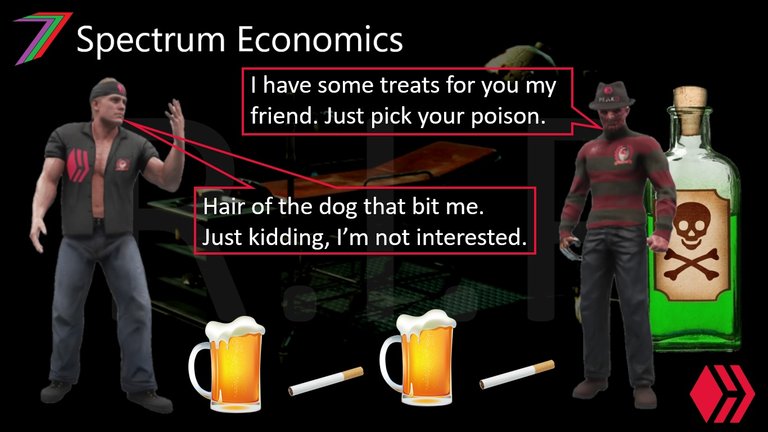
People can suffer from many different types of addictions. All addictions can be harmful to us as they lead to an overindulgence of the subject of our addiction. Some addictions are more dangerous than others. This depends on what we are addicted to as well as extent of the addiction. Addictions can be dangerous because of the direct harm they cause to our bodies, for example, the consumption of toxic substances. Addictions can be dangerous because of the behaviour they induce. For example, violent behaviour to acquire money to support the addiction.
In this post, I focus on the consumption of harmful substances (referred to as poison in this post) such as alcohol, tobacco, and drugs. I discuss the trends in recent years, the success of businesses providing these substances, and how the harm caused by being addicted to poison could be approached.
Defining Addiction and Poison
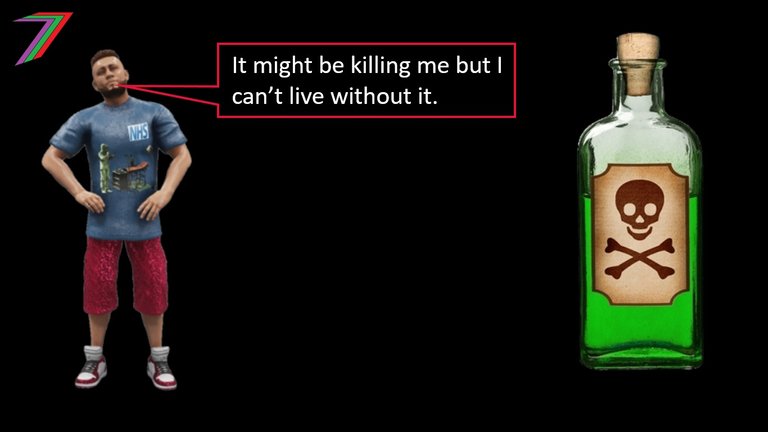
To clarify how I intend to use the terms ‘addiction’ and ‘poison’, I have taken a few definitions from some well-known dictionaries.
Addiction
The state of being compulsively committed to a habit or practice or to something that is psychologically or physically habit-forming, as narcotics, to such an extent that its cessation causes severe trauma (Dictionary.com).
A compulsive, chronic, physiological or psychological need for a habit-forming substance, behaviour, or activity having harmful physical, psychological, or social effects and typically causing well-defined symptoms (such as anxiety, irritability, tremors, or nausea) upon withdrawal or abstinence : the state of being addicted (merriam-webster).
A compulsive habit that people obtain through repetition (Urban Dictionary)
The definitions provided by the dictionaries are consistent. They all emphasis ‘compulsive habits’ as well as a difficulty in being able to cease the ‘compulsive habits’.
Poison
A substance with an inherent property that tends to destroy life or impair health (Dictionary.com).
A substance that through its chemical action usually kills, injures, or impairs an organism (merriam-webster).
Someone or a substance that causes problems, hurt, injury, illness, or death, especially by chemical means (Urban Dictionary).
The definitions consistently state that ‘poison’ is a substance that causes serious harm.
Therefore, addiction to poison is a compulsive habit of exposing oneself to a harmful substance.
Drugs
Drugs can be both addictive and poisonous. How much of a problem is drug addiction and is it getting worse? Figure 1 contains the number of drug related deaths per million people in England and Wales and Figure 2 contains the number of drug overdose deaths in the USA.
Figure 1: Drug Deaths England and Wales (1993 to 2020)
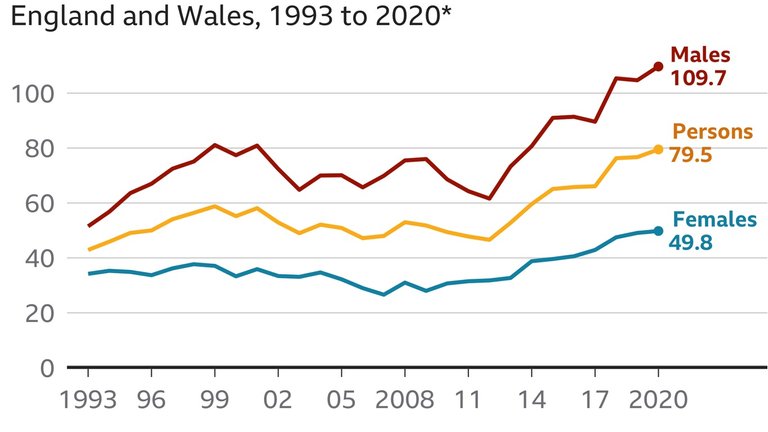
Source: Office of National Statistics cited by the BBC
Figure 2: Drug involved overdose Deaths in the US (1999 to 2019)
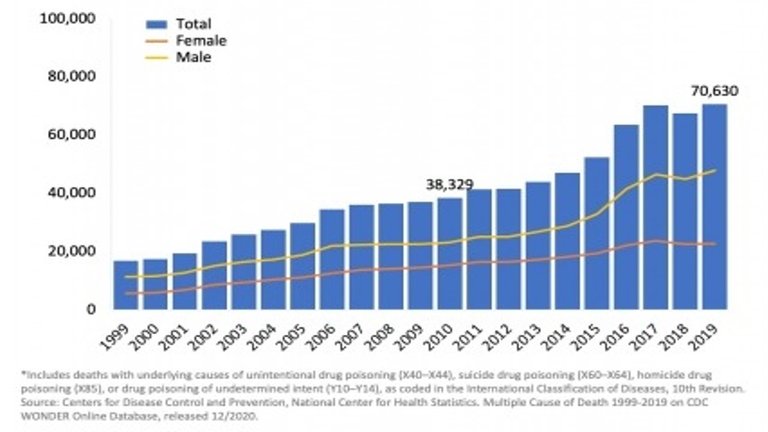
Source: National Institute on Drug Abuse
The number of drug related deaths have increased significantly for both the UK and USA over the past decade (approximately doubling for both countries). These figures do not include long-term medical complications caused by drug abuse, which is also likely to be climbing.
Alcohol
Alcohol can be both addictive and toxic if taken in excessive quantities. How much of a problem is alcohol addiction and is it getting worse? Figure 3 contains the rate of hospital admissions for alcohol related conditions in the UK and Figure 4 captures the number of alcohol, drug, and suicide deaths in the USA.
Figure 3: Admission for Alcohol related conditions
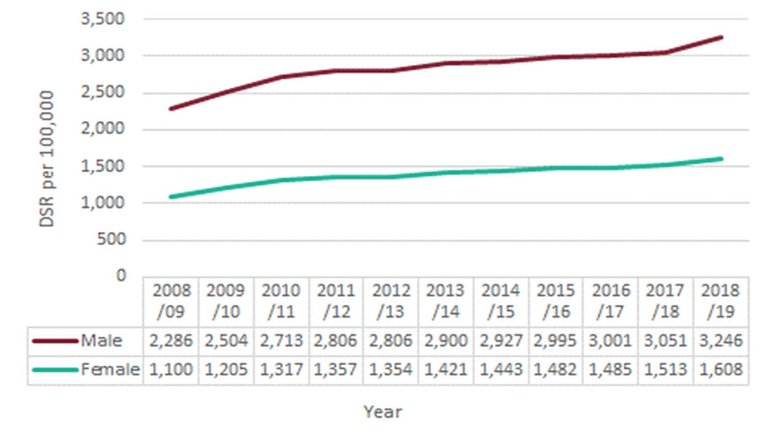
Source: Alcohol Policy UK
Figure 4: Annual Deaths from Alcohol, drugs, and suicide US (1999 to 2017)
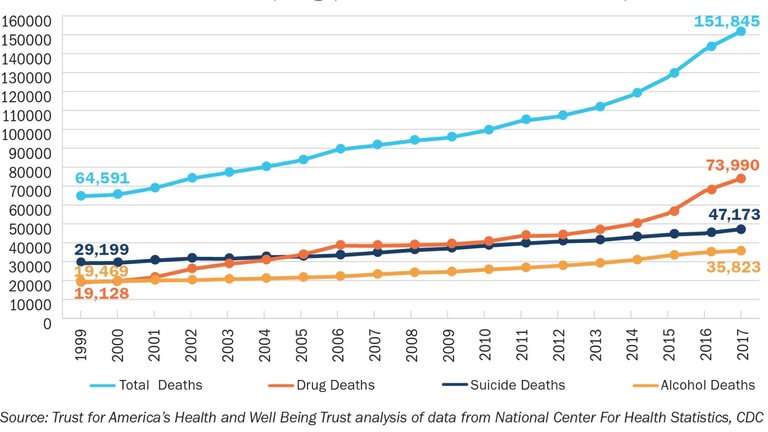
Source: Trust for America’s Health
The above figures indicate that the number of alcohol related illnesses and deaths are increasing for both the UK and the USA. However, this increase is less sharp than drug related deaths. Figure 4 displays a comparison between alcohol related and drug related deaths in the USA.
Tobacco
Tobacco can be addictive and the inhaled smoke is poisonous to our lungs and damaging to our overall health. How much of a problem is tobacco addiction and is it getting worse? Figure 5 contains the death rate for smoking related diseases/illnesses for the world and several other countries from 1990 to 2017.
Figure 5: Death rate per 100,000 from smoking
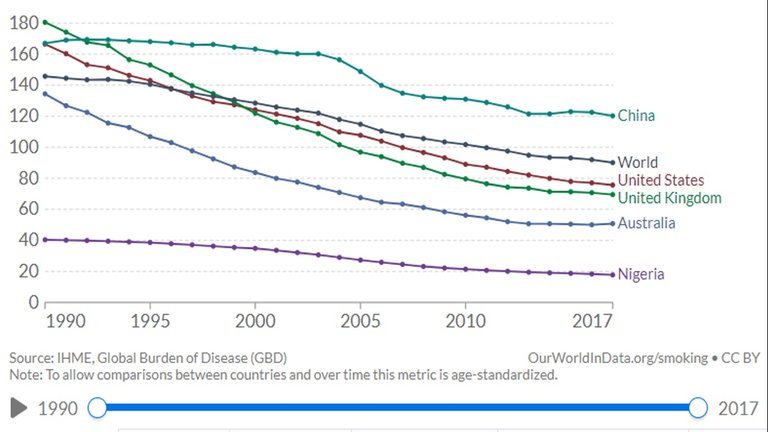
Source: Our World in Data
The death rate linked to smoking is declining on average for the world and Figure 5 indicates the same for countries such as USA, Great Britain, China, Nigeria, and Australia. This fall coincides with decreases in smoking rates for several of these countries. Figure 6 contains the smoking rates for the USA, UK, and Australia.
Figure 6: Smoking Rates USA, UK, and Australia
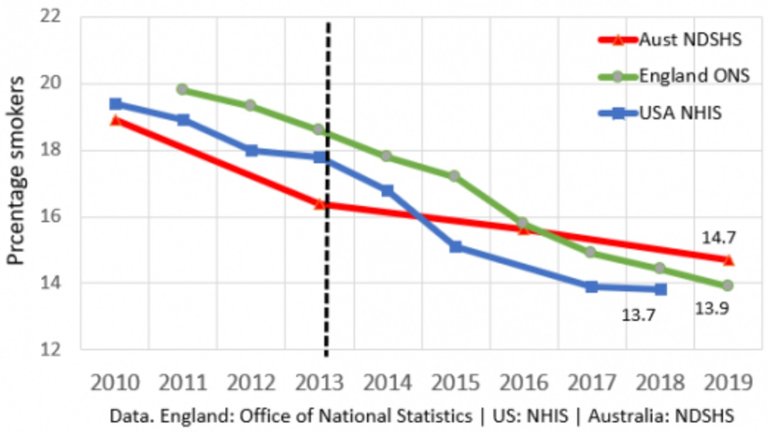
Source: ONS, NHIS, and NDSHS cited by The Counterfactual
However, declining consumption of cigarettes and other tobacco products is still a serious problem in some countries. Even though, death rates and smoking rates are declining in the UK, the number of hospital admissions are still increasing; see Figure 7 below.
Figure 7: Hospital admissions caused by smoking in the UK
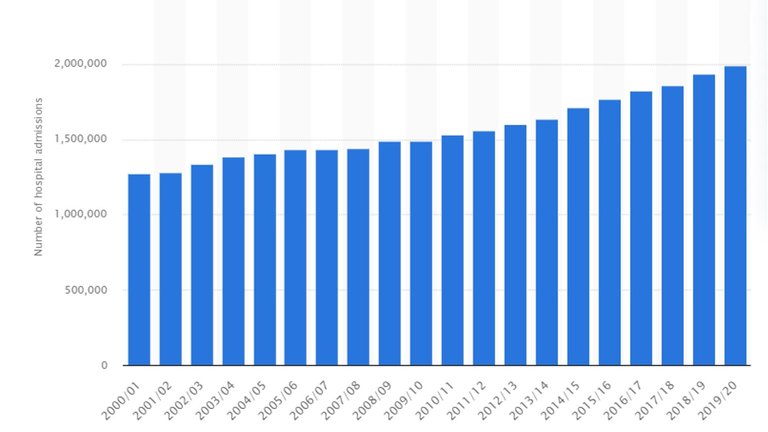
Source: Statista
The rising number of hospitalisations is likely due to the lag between consumption of cigarettes and disease. Most diseases occur because of persistent and long-term usage of tobacco products. Figure 8 compares consumption of cigarettes and the occurrence of lung cancer.
Figure 8: Cigarette consumption and lung cancer
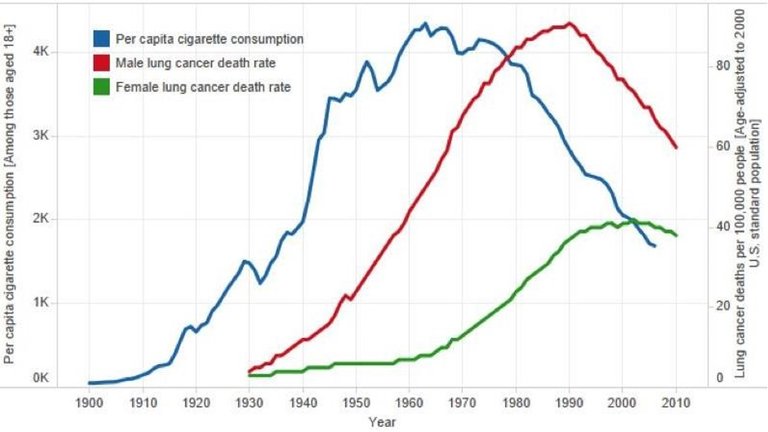
Source: eLife
It appears the decline in the rate of lung cancer lags the decline in cigarette consumption by up to as long as 25 years. It is quite likely former smokers could also suffer from other long-term effects many years after they have quit.
Not all countries are experiencing a decrease in the rate of smoking. Figure 9 contains data of smoking rates for countries with increased rates of smoking between 2000 and 2015.
Figure 9: Countries with higher smoking rates (2000 to 2015)
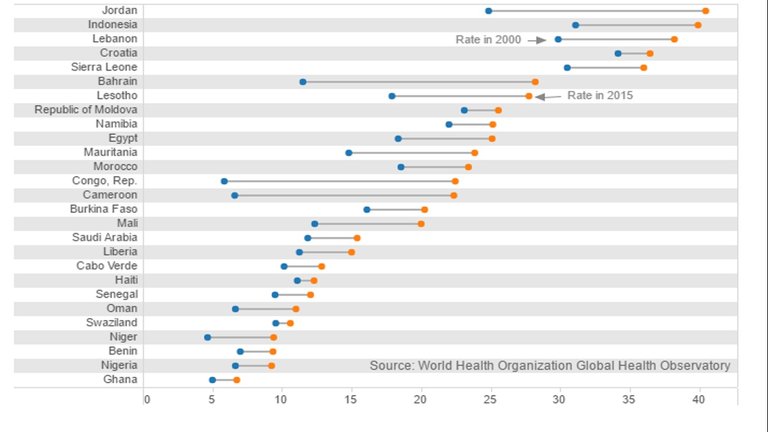
Source: World Economic Forum
Even the global consumption of cigarettes has only marginally decreased over the past 20 years. Figure 10 contains global cigarette consumption.
Figure 10: Global cigarette consumption
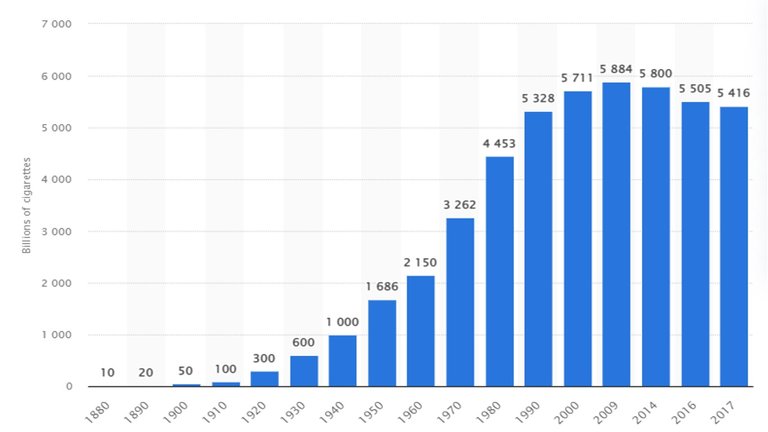
Source: Statista
Smoking related deaths have significantly fallen over the past few decades but the consumption of cigarettes has fallen by a far less significant number. There are several possible reasons for this difference.
- Cigarettes burn faster.
- Quality of healthcare has improved.
- Population increase partially offsets the decreasing rate of usage.
- Change in smoking demographic.
- Increasing income of smokers.
- Availability of less harmful cigarettes.
The relatively small decrease in the quantity of cigarettes sold has enabled the tobacco industry to maintain the size of its market. Figure 11 contains the market value of tobacco manufacturing in the USA between 2012 and 2021.
Figure 11: Market value of cigarette and tobacco manufacturing in the USA (2012 to 2021)
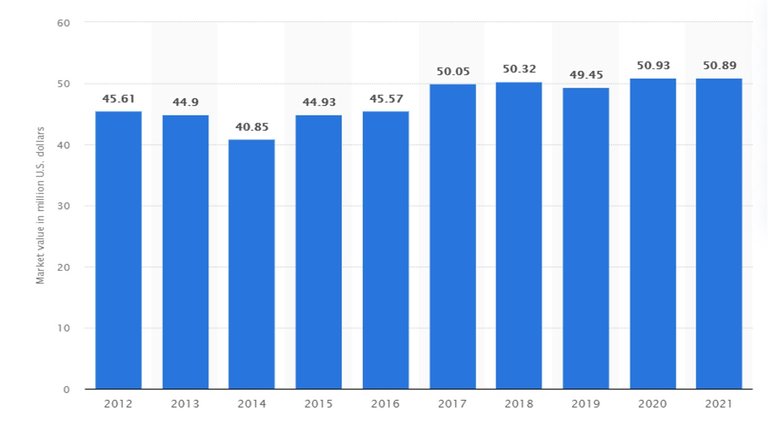
Source: Statista
It is unlikely we will see the disappearance of cigarettes because of lack of demand or reduced profits any time soon.
Oligopoly and Addiction

In my post, Oligopoly – The market structure that does not let the market decide, I heavily criticise the oligopoly market and its inability to provide customers with the outcomes that they truly want. Businesses that produce and/or supply addictive and potentially poisonous substances often fall into the oligopoly market structure.
Alcohol industries, particularly beer, are dominated be just a few companies worldwide. Figure 12 contains the leading brands of beer and their respective parent companies.
Figure 12: Alcohol (E.G. Beer) dominated by a few large companies
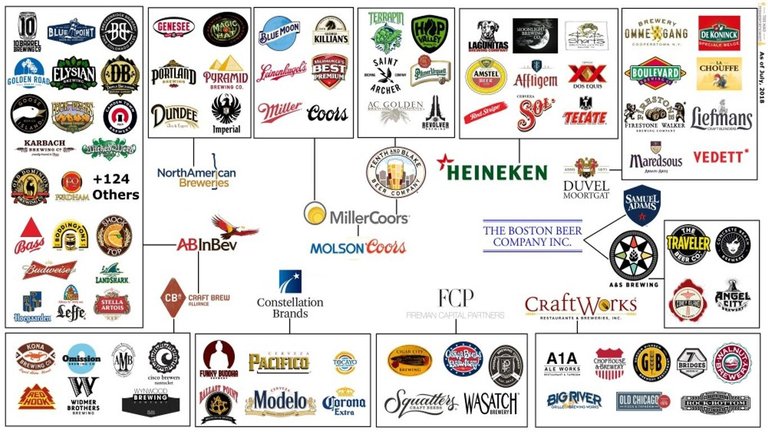
Source: Wine Bersekers
Just a few large companies dominate the cigarette markets. Figure 13 contains the leading tobacco companies worldwide based on sales in 2020.
Figure 13: Leading tobacco companies worldwide in 2020, based on net sales
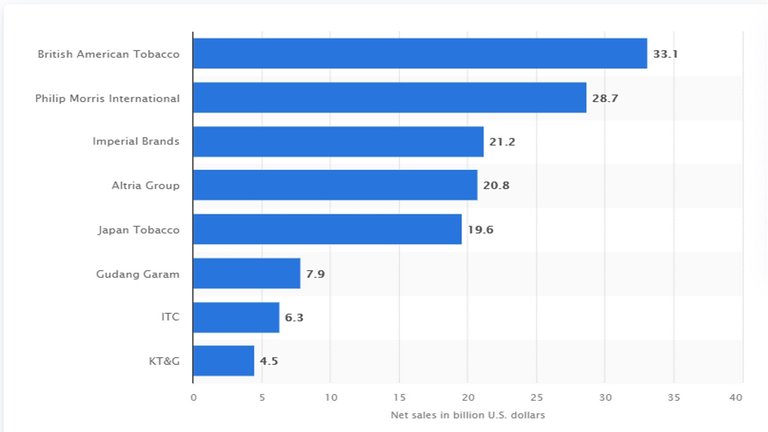
Source: Statista
In terms of legalised drugs, just a few large firms dominate the market; see Figure 14 below.
Figure 14: Pharmaceutical companies market share (2021)

Source: Visual Capitalist
In many countries, just a few main suppliers dominate the illicit drugs markets. Wikipedia contains lists of the drug cartels for various countries such as USA, Mexico, Brazil, Peru, Japan, Sweden, Italy, UK and many others.
Solving the problem.
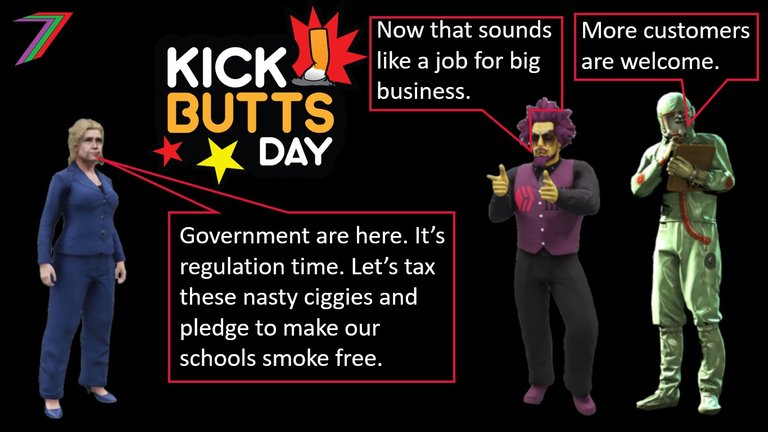
Before we can solve a problem, we need to identify the problem and its causes. I would argue the problem is the excessive consumption of something to the point it becomes harmful. In most cases, the reason for this excessive consumption is addiction. We could target the substance that is causing harm while fuelling the addiction or we could target addiction itself.
Governments normally regulate substances that are perceived to cause the most harm and are relatively more likely to cause addiction.
- They might be taxed such as cigarettes and alcohol.
- They might be banned such as illicit drugs.
- They might require doctor’s prescription to enable access for purely medical reasons.
- They might have limited freedom to advertise products such as cigarettes.
- They might come with compulsory warning labels such as cigarettes.
Do these regulations work? Addiction causes people’s demand to be inelastic. Therefore, taxes raise price with minimal impact on quantity sold. People are more likely to forgo other consumption to support their addiction. Banning leads to substances being provided illegally. This leads to higher prices and lower quality substances that are even more dangerous than if they were legalised. Reduced advertising may limit exposure to some audiences but products such as cigarettes have become very established and have gained significant exposure from existing smokers. Warning labels might be effective at dissuading smokers who are not addicted but unlikely to be effective on people who have already become addicted. Most people are aware of the dangers of smoking without needing to see the labels. It is even possible regulation could worsen the problems related to addiction, if choice is reduced and/or dependence is increased.
Addiction is profitable. It ensures a constant flow of returning customers. It is in the best interest of businesses to have addictive products. Other businesses can compete if they offer other products that fulfil a similar need but are not addictive. However, if a few large firms dominate an industry, competition is limited. The large firms are able to collude to offer similar products with the same addictive properties. Barriers to entry are normally the main reasons competition is limited. For example, barriers to entry into the tobacco market may include requirement of large manufacturing plants, contracts with major retailers (also most likely in an oligopoly market structure), and Government regulation. Smaller firms sharing facilities, more competition in retail sectors, and less Government regulation can overcome these barriers.
There are substitute products to cigarettes such as e-cigarettes. They are intended to offer a similar experience to smoking tobacco but are less harmful. E-cigarettes could be a good alternative to tobacco smokers who wish to quit smoking. However, e-cigarettes could have the opposite impact if people who never smoked previously started using them. Some e-cigarettes contain nicotine, which will still causes addiction. Figure 15 contains smoking trends for cigarettes and e-cigarette usage in teenagers.
Figure 15: Smoking trends in teenagers (US data)
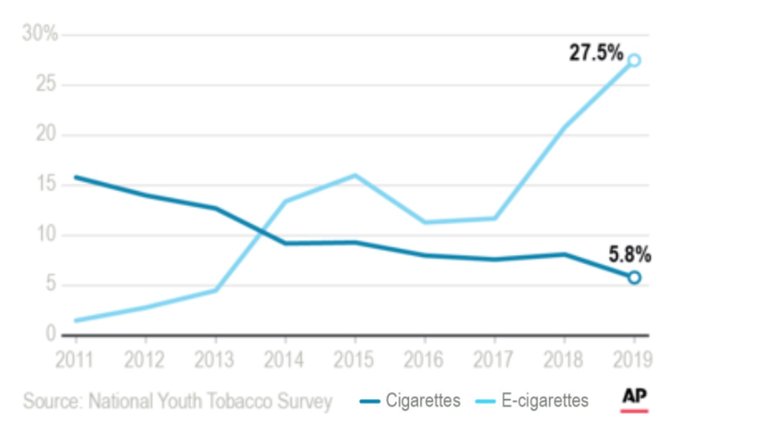
Source: ABC News
The lower use of cigarettes could be seen as a positive indication but the usage of e-cigarettes far exceeds the decrease in cigarette usage. Therefore, the rate of addiction has likely increased even if it is for a less dangerous product. There is also the risk that teenagers using e-cigarettes will switch to cigarettes. This could occur if there are changes in Government regulations (i.e. taxes, bans, etc.).
It is important to note that a small number of large firms (i.e. oligopoly) dominate the e-cigarette market. Addiction is likely to be their intention. Figure 16 contains the market share of the largest firms selling e-cigarettes in the USA.
Figure 16: Market share of firms selling e-cigarettes
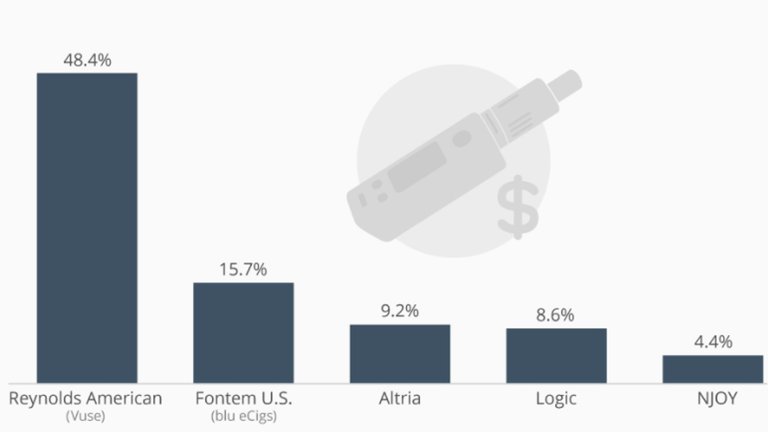
Source: Statista
Targeting addiction is likely to be a better approach than attempting to regulate products. There are many possible approaches to tackling addiction. People can be educated about the dangers of addiction as a preventive measure to reduce the chances of them becoming addicted to a dangerous substance. Whereas, people who currently suffer from addiction/s are able to seek help voluntarily. The community can play a huge role in targeting addiction. Former and currently recovering addicts can help struggling addicts as well as share their stories with young people.
We should also investigate the reasons people decide to begin to consume potentially dangerous addictive poisons. These reasons are likely to vary for different communities and countries. Many addictive substances offer relief to some form of suffering. This could be stress, peer pressure, physical or emotional pain, or long-term depression. We need to understand what is causing the suffering. If this suffering can be relieved or even prevented, we might be able to reduce the number of people who believe they need these substances and thus reduce the number of people who become addicted to them.
In my post, 'Causes, Problems, and Symptoms', I discuss the connections between causes, problems, and symptoms and the value of tackling or preventing problems at different stages. I believe the approaches discussed in that post would be relevant to addiction.
Conclusion
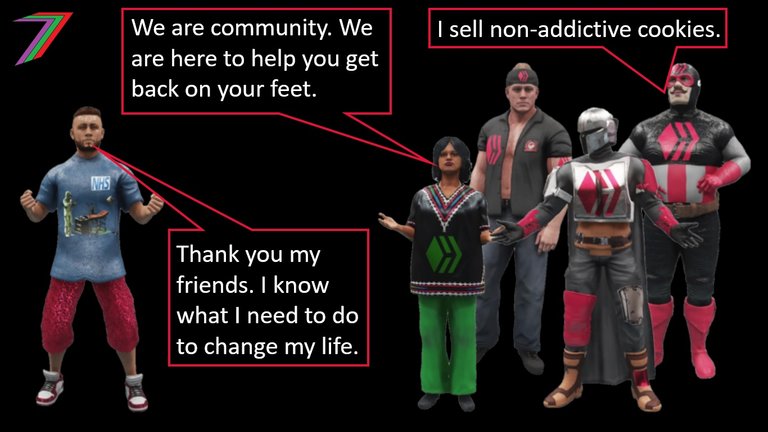
Addiction and the addictive properties of substances is a bigger problem than the poisonous content of the substances. Almost anything can become dangerous if consumed in excessive quantities and on a regular basis. It is the responsibilities of people not to consume substances to the extent they cause a health risk.
Sadly, addiction can greatly hinder people’s ability to consume in moderation. The best outcome would be to prevent addiction ever occurring in the first place. This can happen by educating young people about the dangers of addiction as well as how easy it can be for some people to become addicted. Addiction could also be reduced by greater competition between firms offering products that are potentially addictive. This will increase the safety as well as reduce the addictiveness of products (people want to be able to enjoy something without being dependent on it). Large businesses and Government are the biggest obstacle to creating a competitive environment. Addiction generates profits for the businesses and large businesses help Governments maintain power; see my post ‘Controlled Opposition and Divide and Conquer’ for a detailed explanation.
People, who are addicted to something that is destroying their health, need to want to end their addiction and be willing to take the measures necessary to do so. If they are forced into action, they are unlikely to be motivated to change. It is important that communities and families are willing to help people with addictions. It is important to have the necessary infrastructure and professionals to treat the addiction and compulsive behaviour.
More posts

If you want to read any of my other posts, you can click on the links below. These links will lead you to posts containing my collection of works. These 'Collection of Works' posts have been updated to contain links to the Hive versions of my posts.
My CBA Udemy Course
The course contains over 10 hours of video, over 60 downloadable resources, over 40 multiple-choice questions, 2 sample case studies, 1 practice CBA, life time access and a certificate on completion. The course is priced at the Tier 1 price of £20. I believe it is frequently available at half-price.
Future of Social Media






In Nigeria cigarette producing brands often pay a lot of tax and hence it is very easy for them to sell their product, nevertheless, it is never advertised on national TV, in the media whatsoever. Over the years, I believe the consumption of cigarettes in Nigeria has drastically reduced and this is because people are into much more harder substances. Irrespective of income, people would spend whatever they have to satiate their addiction and more people now die from overdose, which is often dependent on the ignorance of how harmful these substances can be. For example I know of a hard substance called Molly, is rumoured to bring happiness especially for people who are depressed. So many things causes depression in a country like Nigeria. One of these is resultant in financial disappointments. Another thing is that people are battling with depression that comes from peer pressure, hence, addiction to drugs or substances always seems to be the solution.
At the end of the day it may take the willingness of someone who is addicted to actually stop, when they realise they might die from these additions rather than the government influencing these decisions.
This was totally educative, plus, do you smoke?
@tipu curate
Upvoted 👌 (Mana: 45/85) Liquid rewards.
Governments like to encourage addictive and compulsive behaviors. They think it makes people easier to control.
People with addictions are easy to control ... until they suddenly become extremely difficult to control.
!wine
Congratulations, @yintercept You Successfully Shared 0.100 WINEX With @josediccus.
You Earned 0.100 WINEX As Curation Reward.
You Utilized 1/1 Successful Calls.
Contact Us : WINEX Token Discord Channel
WINEX Current Market Price : 0.390
probably right , but I would say the main way of control people is by using fear
fear of god , fear to die , fear to drugs , fear to terrorists , fear to covid...
People can get addicted to ideas. I suspect that people could get addicted to fear.
The lure of horror movies is that the movie invokes fear. Some people really like that sensation. When the government feeds upon fear, they are manipulating an emotion that people cannot control.
Many modern news channels seem to be designed to invoke an emotional response and are not geared toward educating the public.
never liked horror movies, never understood them
You think many old channels were created to educate the mass?
I suspect that the people who produce TV shows are simply trying to create formulas that generate a steady viewership so that they can display ads. The TV shows want actions that release endorphins hoping that viewers will check in each week for their endorphin release.
You are probably right about producers
But what about media owners
I dont think they care about educating people a all but to manipulate that
Now and always
Provided they can benefit off of it, I'm sure they'll be glad to do so, it's mostly about the money with most of these government bodies.
So people are moving from a harmful addiction of smoking to an even more harmful addiction of taking hard drugs. I understand when life is tough, we need some way of escaping it. Many of these harmful substances offer that escape. When I was in the army many of the men turned to smoking to escape the stress of army life. I choose not to smoke and I am glad I did not take it up.
The fear of harmful substances isn't even the issue, people feel that it's relevance to them is better than the health repercussions, in other words, it stems from a lot of societal issues, depression to peer pressure and so many things. I'm glad you made a decision to not take it when you were in the army.
I really find this post interesting, the problem is the manufacturing of this product can it be stopped or reduced, since it's damaging more lives instead of helping and I don't see any good reason for such people to take it. Fine some may say due to depression but it is still adding more salt to injury.
As long as producing these substances is profitable it will continue. People need to choose less addictive substances to help relieve stress, pain, etc. When businesses offer these better alternatives, production of the addictive substances will fall.
I think everything can be controlled...life is meant to be enjoyed and unless and untill you won't taste than it's not easy to understand the taste, pros and cons of it....I tasted few of the poisons...but never let these to get over me...I mean addiction...yes once I was addicted to some Indian snacks...but when I realised I am getting habitual to it, I stopped using it....even though it was kept in my cupboard....
Some people are more prone to addiction than others. I think we just need to be aware of the possibility of addiction and recognize it as soon as possible. It was good you recognized that you were starting to overindulge in those snacks.
Tobacco seeds have been found in archeological investigations 15k years ago
I agree commercial cigarettes contain a lot of quimical toxic components
But ar u sure the coca-cola or energy drinks many people often drink in the last century are healthier ?
I think the added chemicals are a big part of the problem as they make the cigarettes more dangerous and they effect how our bodies absorb the nicotine. An excessive consumption of coca-cola and energy drinks is very bad for your health and they can be very addictive for some people. I would argue if addiction can be broken, the damage can normally be reversed.
You are probably right on added chemicals
Where I live it is hard to buy tobacco directly from farmers , so little option to get other kind of tobacco , anyway it is overtaxed
Coca-Cols ,RedBull, quimically growned vegetables , we are eating and drinking many new things this century , Do know the long term effects?
Looks like tobacco have been smoked for at least 15k years , probably there are reasons for that
People can be addicted to so many things...
Addictions are not good ?
Excessive consumption of sodas and energy drinks can cause diabetes and contribute to heart disease. I would consider both these as long term effects and permanent. We could argue anything with high sugar content would cause similar problems.
Alcohol when metabolized by the liver produces alcohol dehydrogenase. This is the substance that does all the damage.
The disease that develops alcohol is called alcohol liver disease.
Sufferers of this disease who are addicts also have delirium tremens when tbey try to stop taking alcohol...leading to a spiral of illness that later lands them with liver cirrhosis and liver failure.
A very nice post you gave.
Armed with all this knowledge I drink but in moderation and on special occasions.
Thanks for sharing!!
Thanks for the info @ebingo.
Alcohol consumption is encouraged in many cultures. People who don't drink alcohol are sometimes stigmatized and pressured into doing so. This is bad for anyone prone to addiction. It is very important that people understand the importance of taking in moderation from a young age.
This is a great post! Everything is understandable and educative, I didn't even realized how long it was till I finished it.
The United States, Canada, Nigeria, and Australia rank the highest, with over 10% of the population over age 15 admitting to using the drug according to the web and To be really honest, I don't think there is a solution to addiction and I will explain using my country Nigeria as an example.
In Nigeria, there are a lot of smokers,even from kids to adult,they smoke various things. Cigarettes are a joke to many youths in Nigeria as it doesn't have half the effect of the type they smoke.(I'm not good with the names but I know of Colorado, and some rizal wrapped ones too).
It difficult to blame them,as many are suffering from being abandoned by their parents and the government,while others are living in extreme poverty. This drugs too are cheap to afford and hence the addiction!
Like @josediccus said below, Molly is there too, and yes,they say it brings happiness to the user, I know that one is expensive because I don't see it around but should it drop in price am sure my people won't stop taking it ever!
This is another reason for the trend. If something is easily accessible, it aids more intakes. There are several drugs businesses in the street that thrives everyday,it is sad to me but it also makes the people in this business line happy!.
Thanks for sharing.
I think stress, pain, and depression pushes people towards taking substances that offer temporary relief. Unfortunately, many of these substances such as drugs cause even more suffering.
We can look at what is causing people to turn to drugs in the first place. For example, tackling poverty should also reduce the rate people turn to drugs and prevent them from getting addicted in the first place. Of course, tackling poverty is not something that can be done overnight. We would need to understand the causes of poverty as well.